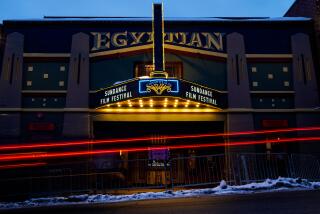Sundance 2011: Summing up, that antic spirit still shines through
From Park City, Utah — — If you attend the Sundance Film Festival on a regular basis, you’re supposed to grumble about the event, the snow and the cold, the crowds on the streets, the putative creeping Hollywoodization of the place. I could join in the grumbling, really I could, but that would be wrong.
It would be wrong because though the festival has gotten ever bigger — and (thankfully) more efficient in moving its close to 50,000 attendees in and out of its far-flung theaters — it still retains the scrappy, antic spirit that has animated it from the start.
Sundance is still the place, after all, where you can watch a local bluegrass band, Bramble, perform outdoors in the midst of a raging snowstorm and hear a crowd lustily cheer actor Rutger Hauer, here with two movies, on his 67th birthday.
It’s also the place where unknown Philadelphia filmmaker Jon Foy, egged on by his girlfriend, entered his documentary “Resurrect Dead: The Mystery of the Toynbee Tiles” on the night before the deadline after self-financing it by cleaning apartments for 51/2 years. He not only got in, but he also won the documentary directing prize.
One of the paradoxes of Sundance is that the quirkiness and charm around the edges of the festival are not always fully appreciated because so much of the media focus is on the premieres section and the U.S. dramatic competition. Though some splendid films are screened in these sections (most notably this year the grand jury prize-winning “Like Crazy,” which also took home a special jury prize for actress Felicity Jones), overall these elements are, frankly, often the weakest parts of the festival.
This year, when purse strings were loosened, more than a dozen dramatic films were acquired for distribution. That number seems way out of proportion to the quality of the films, or to how well they will likely do in the marketplace.
In documentaries, the situation was reversed: The quality was sky high, but hardly any were acquired for theatrical release. With audiences reluctant to embrace the genre, fewer and fewer are getting a shot at multiplexes, which, given their narrative strength and potential playability, is really a shame.
Sundance’s insistence on giving equal weight to documentaries and dramas has made it into as important a nonfiction showcase as any festival in the world; witness the fact that four out of the five Oscar-nominated docs this year debuted at Sundance last January.
This year’s documentaries were at least the equal of last year’s, and not just the two moving jury winners (“How to Die in Oregon,” about the death-with-dignity movement in that state, and “Hell and Back Again,” about a U.S. Marine returning from Afghanistan) and the two audience winners (“Buck,” the irresistible story of the real-life horse whisperer, and “Senna,” a breathless tale of the James Dean of Formula One racing that reaches out and grabs you by the throat).
Other compelling biopics were “Reagan,” which presents a portrait of a more complex man than the standard conservative iconography suggests, and “Sing Your Song,” about Harry Belafonte’s formidable civil-rights activism. Also politically aware was the intellectually scalding “Hot Coffee,” which tells you that everything you thought you knew about so-called frivolous lawsuits is wrong.
The foreign language film competition, highlighting impressive if not always commercial films, is a strength at Sundance, and yet that field is given even less popular attention than the documentaries. This year, the smart and funny Norwegian film “Happy, Happy” won the competition. Also especially enjoyable were the Japanese “Abraxas,” an almost indefinable film that mixes lively humor with seriousness as it shows a Buddhist monk attempting to reconcile his religious present with a past as a berserk heavy metal rocker. Equally unexpected was the Italian “Lost Kisses,” a visually playful and decidedly stylish look at what happens when a teenage Sicilian girl claims to have been visited by visions of the Madonna.
All in all, Sundance has become such an iconic place in the American independent world that even not getting in can be a cause for merriment and spin.
At least that’s what directors Ryan Page and Christopher Pomerenke decided when they sent out a press release announcing that their film “Queens of Country” marked the third year in a row one of their works had been turned down. Hardly daunted, Pomerenke announced: “We are in pre-production on our next project titled ‘Xander’ and we look forward to being rejected by Sundance Film Festival again next year.”
More to Read
The biggest entertainment stories
Get our big stories about Hollywood, film, television, music, arts, culture and more right in your inbox as soon as they publish.
You may occasionally receive promotional content from the Los Angeles Times.











